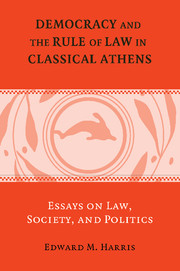Book contents
- Frontmatter
- Contents
- PREFACE
- ACKNOWLEDGMENTS
- ABBREVIATIONS
- INTRODUCTION
- I LAW AND CONSTITUTIONAL HISTORY
- II LAW AND ECONOMY
- III LAW AND THE FAMILY
- 1 Did the Athenians Regard Seduction as a Worse Crime than Rape?
- 2 Did Rape Exist in Classical Athens? Further Reflections on the Laws about Sexual Violence
- 3A Women and Lending in Athenian Society: A Horos Re-Examined
- 3B Notes on a Horos from the Athenian Agora
- 4 The Date of Apollodorus' Speech against Timotheus and Its Implications for Athenian History and Legal Procedure
- 5 A Note on Adoption and Deme Registration
- IV ASPECTS OF PROCEDURE
- V ENVOI
- BIBLIOGRAPHY
- INDEX LOCORUM
- SUBJECT INDEX
2 - Did Rape Exist in Classical Athens? Further Reflections on the Laws about Sexual Violence
Published online by Cambridge University Press: 25 February 2010
- Frontmatter
- Contents
- PREFACE
- ACKNOWLEDGMENTS
- ABBREVIATIONS
- INTRODUCTION
- I LAW AND CONSTITUTIONAL HISTORY
- II LAW AND ECONOMY
- III LAW AND THE FAMILY
- 1 Did the Athenians Regard Seduction as a Worse Crime than Rape?
- 2 Did Rape Exist in Classical Athens? Further Reflections on the Laws about Sexual Violence
- 3A Women and Lending in Athenian Society: A Horos Re-Examined
- 3B Notes on a Horos from the Athenian Agora
- 4 The Date of Apollodorus' Speech against Timotheus and Its Implications for Athenian History and Legal Procedure
- 5 A Note on Adoption and Deme Registration
- IV ASPECTS OF PROCEDURE
- V ENVOI
- BIBLIOGRAPHY
- INDEX LOCORUM
- SUBJECT INDEX
Summary
When studying the evidence for sexual violence in Classical Athens, one is immediately struck by a curious fact: the ancient Greeks had no word that is the precise equivalent of our word “rape.” This, of course, does not mean that acts that we would call acts of rape did not occur in Classical Athens or in other Greek poleis. On the contrary, our sources make it abundantly clear that such acts did occur. For instance, Pausanias (9.13.5; cf. Xen. Hell. 6.4.7) tells the story of two young Boeotian women who were the victims of sexual violence (βιάζονται) at the hands of two Spartan soldiers. In shame at their dishonor (ὕβρεως), both women killed themselves. When their father was unable to obtain justice for his daughters from the Spartan authorities, he too committed suicide. For us there is no doubt that this was an act of rape; in fact that is the way translators render the term. In the prologue to Euripides' Ion, the god Hermes tells us that Apollo “married by force” (10–11) the young Creusa, who became pregnant and bore a son, whom she exposed. The language of tragedy is more delicate, but still makes clear that Apollo had sex with Creusa against her will. We would not hesitate to call what Apollo did to Creusa an act of rape.
But in each of these passages the author does not use a word that is equivalent to our term “rape.” Pausanias uses the term hybris when he refers to the rape of the two young Boeotian women, but this term has a broader semantic range than the word “rape” in English.
- Type
- Chapter
- Information
- Democracy and the Rule of Law in Classical AthensEssays on Law, Society, and Politics, pp. 297 - 332Publisher: Cambridge University PressPrint publication year: 2006
- 1
- Cited by



